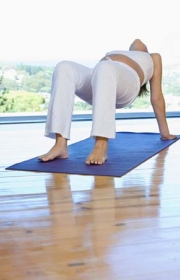Beginners Exercise During Pregnancy
 Lets take a look at the basics of exercise, what you should be doing and what you should NOT be doing.
The best idea, if you plan on becoming pregnant is to start an exercise program before conceiving. If you do begin a program after becoming pregnant, check with your doctor first to make sure it is safe to exercise, then start off with short intervals of exercise at a fairly low intensity, allowing the intensity to increase gradually over time.
Your goal when exercising while pregnant is this: you want to strengthen your own body, without risking injury to yourself or placing any strain on your growing baby. The purpose should never be to lose weight while you are pregnant, but rather to simply feel better, sleep better and to prepare your body for the months to come.
Lets take a look at the basics of exercise, what you should be doing and what you should NOT be doing.
The best idea, if you plan on becoming pregnant is to start an exercise program before conceiving. If you do begin a program after becoming pregnant, check with your doctor first to make sure it is safe to exercise, then start off with short intervals of exercise at a fairly low intensity, allowing the intensity to increase gradually over time.
Your goal when exercising while pregnant is this: you want to strengthen your own body, without risking injury to yourself or placing any strain on your growing baby. The purpose should never be to lose weight while you are pregnant, but rather to simply feel better, sleep better and to prepare your body for the months to come.
It is important to warm up and stretch
Beginning an exercise program can be overwhelming and painful if you aren’t careful. Warming your body up and stretching prior to exercise is very important for your health, as well as that of your baby. If at any time you feel dizzy, experience cramps, or have any vaginal bleeding, simply stop!! Read our danger signs article for more. Warming up and stretching before exercise is important since it serves to raise your body and muscle temperature, along with preparing your cardiovascular system, respiratory system and nervous system for the demands of exercise by increasing the blood circulation slowly. Warming up will allow all of your connective tissues, muscles and joints that haven’t been stretched in a while to handle the stress put on during exercise, limiting your chances for injury. Connective tissue is similar to hard plastic; if you don’t warm-up plastic it won’t be flexible and is much more likely to snap. By warming-up and stretching correctly you will also help reduce the severity of soreness the next day or two following exercise.Start out slow and keep things in moderation
A warm-up should be done with a low impact exercise, such as stationary biking or walking, gradually picking up the pace as you progress. Never get onto equipment that you feel at risk for falling off; your balance is quite different than from pre-pregnancy. These exercises allow your body to warm-up with limited stress to your joints. Hold a stretch in a comfortable position for 15 seconds, never stretching into pain and never bouncing. Stretching itself does have many positive benefits for pregnant women, including improving posture and balance that might be strained due to the added weight which you are carrying about, especially in the later stages of your pregnancy. One reason that soreness might occur is trying to do too much too soon, so don’t try to make up for lost time. Start out with a few exercises and slowly progress. Your body will gradually adapt to the increased stress. If you are starting resistance training for the first time, try picking 1-2 exercises for each area of the body, the upper body, lower body and core. If it starts to hurt, stop. Don’t place any unneeded stress on your body or to the baby. If you are a beginner to aerobic training, start out with walking or something that raises your heart rate a little bit, nothing that will get you out of breath. Try doing this for 10 minutes the first few times you exercise, slowly progressing your time. As you increase the time to where you can handle 30 minutes at that pace, you can start adding a little more intensity. So you could do 2 or 3 days of 30 minute training at your initial pace, with a 10-minute day at an increased intensity. Most people expect to exercise the first few weeks and experience a shot of energy. In actuality, the opposite occurs at first. Your body isn’t use to the added work, which causes you to feel fatigued and even drained, especially if you are over doing it. Don’t get discouraged, it’s natural to feel this way until your body adapts.Take care of yourself during and after the workout
Overdoing it will cause stiffness and soreness, causing many women to give up on exercise completely. If you do strain your muscles, there are a few things you can do to feel better. Exercise actually breaks your muscles down. Sleep, nutrition and hydration play a vital role in their growth. Proper rest, feeding your body healthy food and drinking plenty of water will help your body recover much quicker. Dehydration might also be a concern. Your body loses a large quantity of water during exercise, so it is very important to drink more water as you exercise. Active people should drink at least 10-12 eight-ounce glasses a day. Make sure to take plenty of breaks throughout to refuel. Headaches, stiffness and cramping are all results of dehydration. As with any normal exercise program, a cool-down should be included. This will help to gradually lower your blood pressure and heart rate to it’s normal pregnancy level. If you simply stop, your blood pressure may drop too quickly, which is obviously dangerous. This might included a leisurely walk as well as stretching. Pregnancy VideoRelated Video
In our pregnancy video section we have a whole range of videos for you to watch which cover a whole range of subjects, from general pregnancy, complications, newborn care and even beauty.
We have a video which related to fitness and exercise – so be sure to check it out in the video section here
Pregnancy VideoRelated Video
In our pregnancy video section we have a whole range of videos for you to watch which cover a whole range of subjects, from general pregnancy, complications, newborn care and even beauty.
We have a video which related to fitness and exercise – so be sure to check it out in the video section hereBeginners Exercise

